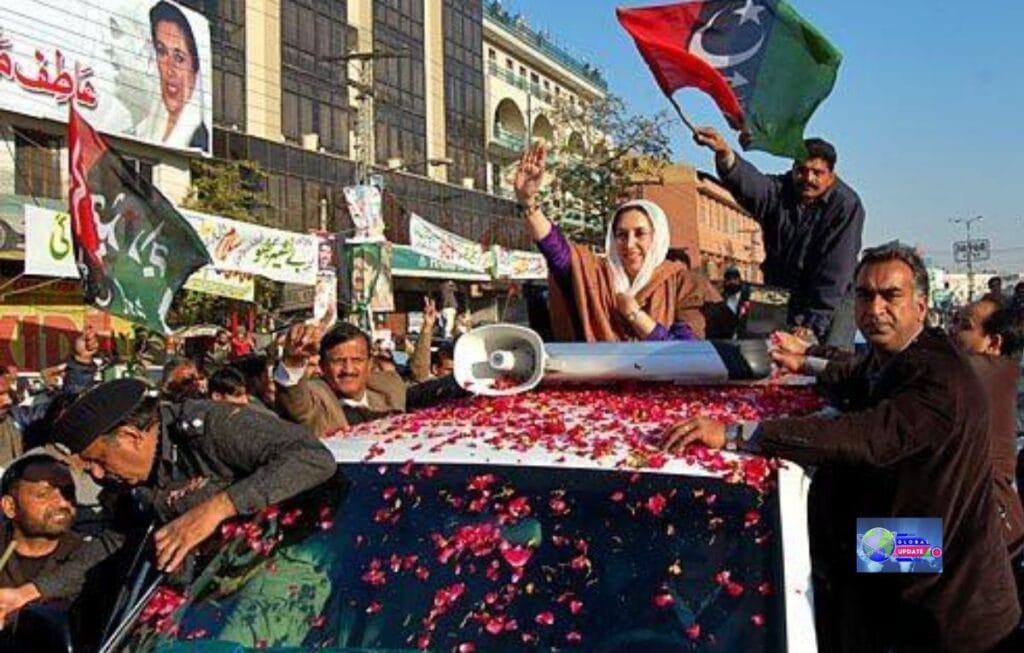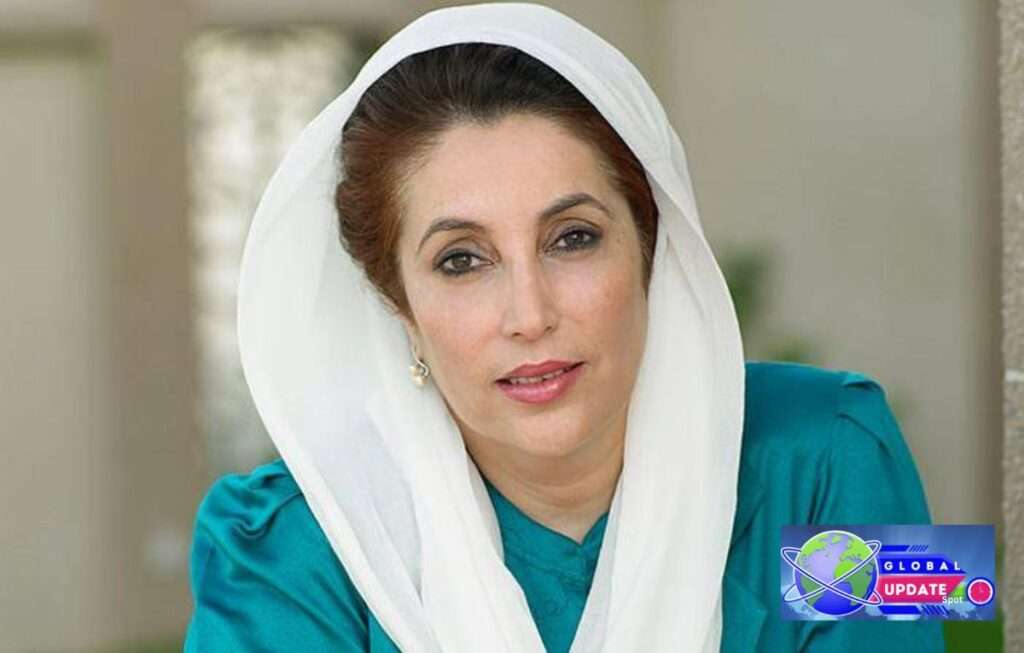Born in Karachi, Pakistan, on June 21, 1953, Benazir Bhutto was a major political leader and the first woman to rule a nation with the most Muslims in modern history.
Political accomplishments, personal adversities, and a steadfast dedication to democratic ideals characterized her life.

The day Benazir Bhutto died is December 27.
Today marks the anniversary of the death of Shaheed Benazir Bhutto, which occurred in Rawalpindi on December 27, 2007. People in Pakistan remember her as a symbol of democracy, bravery, and political fight.
Pakistan will be remembering Benazir Bhutto on the 18th anniversary of her death in 2025. It has been 18 years since her sad death, which shocked the whole globe.
Benazir Bhutto previously served as the prime minister of Pakistan.
Benazir Bhutto was the first woman to be prime minister of Pakistan and the first woman to head a country where Muslims are the majority. She was prime minister twice and made history in Pakistan’s democratic politics.
What is the political legacy of Benazir Bhutto?
Benazir Bhutto was the head of the Pakistan Peoples Party (PPP) and advocated for democracy, women’s rights, and civilian rule. Her political ideas still shape Pakistan’s politics through her party and supporters.
Benazir Bhutto was murdered on December 27, 2007.
During an election rally in Rawalpindi, Benazir Bhutto was killed while running for the 2008 general elections. Her death is still one of the most terrible and important events in Pakistan’s political history.
Benazir Bhutto: The Muslim World’s First Prime Minister
Benazir Bhutto is a significant figure in global politics, recognized for her leadership in Pakistan and historic achievement as the first woman to govern a Muslim-majority nation.
This blog post explores the various aspects of her life, analyzing her extraordinary journey, her contributions to Pakistan and the Muslim world, and the intricacies that define her term.
Benazir Bhutto’s formative years and academic background
Benazir Bhutto was born into a politically influential family. The Bhutto family, known for their political influence, hails from Karachi, Pakistan. Zulfikar Ali Bhutto, her father, served as Pakistan’s prime minister.
Benazir, educated at Harvard University and the University of Oxford, exhibited her intellectual excellence by obtaining degrees in comparative government and international law.

Her affluent background afforded her entry into esteemed educational establishments.
After attending the Convent of Jesus and Mary in Karachi, she went to Harvard University to finish her undergraduate studies and earn a degree in government.
After that, she pursued her education at the University of Oxford, majoring in economics, politics, and philosophy.
These formative years endowed her with distinctive skills and insights, influencing her subsequent political pursuits.
Ascendancy in Politics
In 1979, Benazir began her political career following the execution of her father.
In 1988, she became the inaugural female Prime Minister of Pakistan, marking a crucial achievement for both herself and women in the Muslim world.
Her commitment to social reform, women’s rights, and democratic governance defined her leadership approach.
The Ascendance to Leadership
Both ambition and challenge characterized Benazir Bhutto’s foray into politics. Following her father’s execution in 1979 by the administration of General Muhammad Zia-ul-Haq, Benazir emerged as a symbol of opposition to authoritarian governance.

Notwithstanding considerable challenges, such as incarceration and exile, she ascended as a notable opposition leader in the 1980s.
In 1986, Bhutto returned to Pakistan owing to her political understanding and capacity to mobilize support. Subsequently, she gained leadership of the Pakistan People’s Party (PPP), the political organization established by her father.
The political situation in Pakistan was chaotic; an unquenchable yearning for democracy among the citizens propelled her campaign. She resonated with the electorate, especially women who perceived her as a symbol of optimism in a patriarchal culture.
Her term as prime minister was historic.

Benazir Bhutto became the first woman to serve as prime minister of Pakistan, a country with a majority of Muslims, in December 1988.
In addition to its historical significance, her tenure was noteworthy for the difficulties she encountered.
Bhutto’s administration sought to rectify the socio-economic inequalities afflicting Pakistan, achieving significant progress in advancing women’s rights, education, and healthcare.
Her administration implemented numerous social reforms, encompassing programs to enhance literacy rates and healthcare accessibility for women.
Bhutto undertook a deliberate initiative to tackle gender imbalance and improve women’s involvement across all industries.
She established the Women’s Development Program and appointed women to senior government positions during her tenure.
Her message was clear: skill and commitment to public service, not gender, determine leadership and governance.
However, Bhutto’s administration faced numerous challenges. Political divisiveness, corruption charges, economic instability, and bureaucratic opposition tarnished her reign.
The government’s attempts to enact progressive reform frequently encountered obstacles from conservative groupings and established political elites.
Nonetheless, Bhutto steadfastly championed democracy and reform, establishing a benchmark for subsequent generations of female leaders in the Muslim world.
Second term and persist in facing difficulties
Bhutto secured a second term as prime minister in 1993 following her dismissal in 1990.
Her second term presented her with numerous obstacles akin to those previously encountered. She again endeavored to tackle the nation’s critical challenges, encompassing poverty reduction, education, and women’s empowerment.
Notwithstanding her significant accomplishments, allegations of corruption overshadowed her administration, resulting in a contentious legacy.
The subsequent ouster of her government in 1996 marked the commencement of a phase characterized by instability and political turmoil in Pakistan.
Notwithstanding her political challenges, Bhutto persisted in championing democracy, human rights, and gender equality domestically in Pakistan and globally.
Obstacles and Exile
Even with her accomplishments, accusations of corruption and economic incompetence tarnished Benazir’s tenure as prime minister.
She faced political issues that resulted in her dismissal twice, first in 1988 and again in 1996.
1999, she entered self-imposed exile, residing in London for several years.
Benazir Bhutto’s Repatriation to Pakistan
Benazir returned to Pakistan in 2007, intending to participate in the forthcoming elections. Tragedy greeted her upon her return.
A suicide attempt targeting her car in Rawalpindi on December 27, 2007, resulted in her premature demise.
A Heritage of Endurance
Benazir Bhutto’s legacy is intricate and diverse. People praised her for breaking down gender barriers and promoting democracy.
On the other hand, controversy and allegations tainted her political career. Her assassination has profoundly influenced Pakistan’s political environment.
The killing of Benazir Bhutto on December 27, 2007, marked a significant and tragic juncture for Pakistan and her global supporters.
Her demise shocked the political arena and incited extensive outrage and demonstrations. Nevertheless, her legacy has persisted.
People remember Bhutto not only as a pioneer for women in politics but also as a champion of democracy and progress in a region often scrutinized for its gender dynamics.
Benazir Bhutto is an emblem of optimism for several women, especially in Muslim nations, who seek leadership positions under challenges.
Her life illustrates resilience—the capacity to overcome adversity and advocate for one’s principles and ideals. Today, her story motivates women in the Muslim world, urging them to engage in the political sphere and pursue equality across all aspects of life.
Supporting the rights and empowerment of women
In Pakistan, Benazir Bhutto was a trailblazer for women’s rights.
Her leadership facilitated the advancement of women in politics and motivated a new generation of female leaders.
She championed gender equality, advocated for girls’ education, and promoted increased female participation in public life.
The Bhutto Political Dynasty

The Bhutto family has been significant in Pakistani politics. Notwithstanding struggle and loss, the Bhutto legacy endures via Benazir’s offspring, especially her son Bilawal Bhutto Zardari, who has engaged in politics following his mother’s path.
Conclusion
Both accomplishments and tragedies characterized Benazir Bhutto’s life. One cannot overstate her influence on Pakistani politics, particularly women’s rights.
The obstacles she encountered and the bravery she showed persist in inspiring political leaders and activists globally. Benazir Bhutto’s legacy epitomizes endurance, determination, and the persistent quest for democracy and equality in Pakistan.
Upon reflection, Benazir Bhutto’s historical importance extends beyond her position as a Muslim-majority country’s inaugural female prime minister.
She embodies the potential for transformation, the fight for rights, and the unwavering quest for democratic principles.
Despite her triumphs and problems, Bhutto’s influence on Pakistan’s political scene and the wider Muslim world is indisputable.
Her journey exemplifies that leadership transcends gender and that the struggle for equality and democracy persists.
In contemplating her legacy, we acknowledge her as a pioneer whose impact motivates emerging leaders to pursue justice and empowerment.



